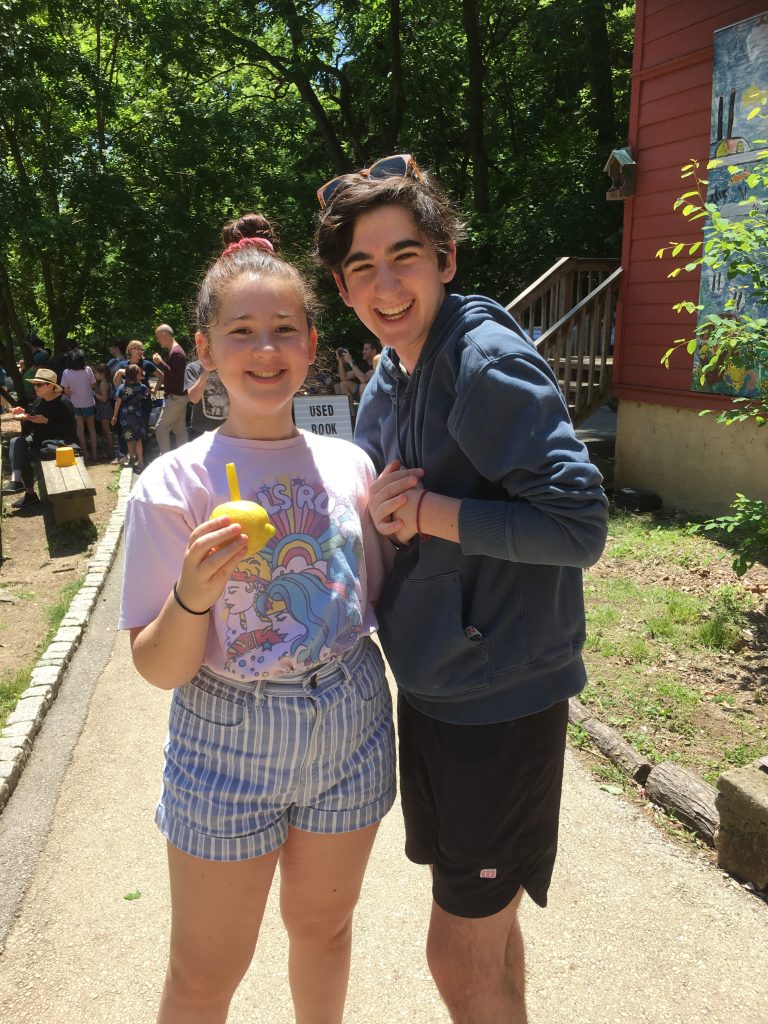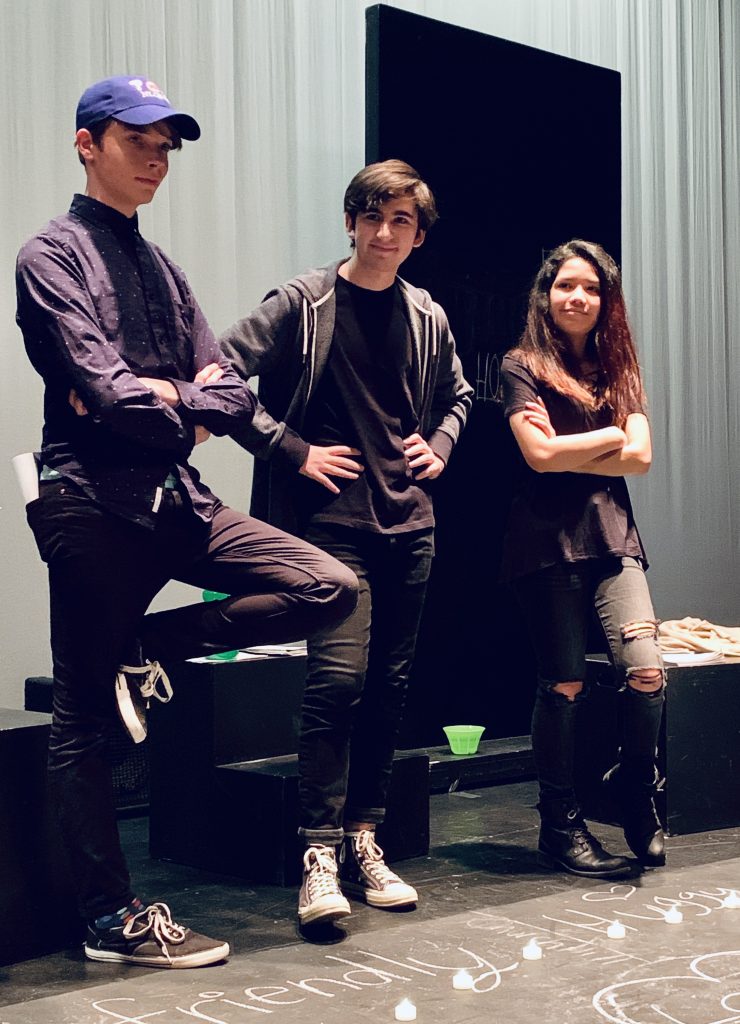Gabriel Seplow ’14 : An Organic and Perfect Experience
Not every 18-year-old knows exactly (or nearly so) what they want to do with the rest of their life, nor can they articulate their decision clearly and confidently.
That is not the case with Gabriel “Gabe” Seplow ’14, however.
“I love being on stage and I want to act, wherever and however I can. I love telling stories, and I love directing, and I would love to pursue that too. Broadway would be a dream,” he says. He also is open to teaching or mentoring others.
But it is the acting that is clearly his passion and something he has nurtured and pursued almost as long as he can remember.
Born and raised in the Mt. Airy neighborhood of Philadelphia, he isn’t sure how his parents came to send him to The Miquon School, but his mom, Carolyn Seplow, remembers clearly.
“I understood that Miquon was about growing unique individuals who know how to develop ideas of their own and speak about them confidently, and I believe they did a great job with that,” she says, adding that the fact that he would be able to experience such wonderful outdoor space—a place and time to climb trees, run up and down hills and learn in the open air—was a plus, especially since the family lives in a Philadelphia row home with no yard.
Gabe was so successful at Miquon that Carolyn sent his younger sister, Juliet, now in 6th grade, there too.

“Miquon is its own unique experience,” Gabe says when asked to recount some of his favorite memories of his years at the school. “I always tell this story . . . when I was in 5th grade, there was a day when it was pouring, and there is one part of the bamboo forest that has a very steep, dirt hill, which was a super-steep mud hill that day,” he says with a laugh. “We were outside [during Choice Time] and sliding down the hill and ended up covered in mud, head to toe, laughing without a care in the world. It was such a carefree, just-be-yourself world and I would go back in a minute!”
From that supportive environment in which children are encouraged to simply be who they are, Gabe says he was able to confidently move forward just being himself and that confidence is mirrored in his next description:
“You are able to identify yourself as yourself [at Miquon]. In a lot of places, you’re told exactly what to do, but there’s a reason it’s called Choice Time and not recess. Make a choice for yourself that will make you happy. If that’s soccer, go play. If it’s sliding down a mud hill, then do that. Go find the little creatures in the creek. What bugs live in that tree? What did you find in the bamboo forest and then take to science class? We played in the creek, and then went to the same creek in science class and scooped a cup of water and learned from the macroinvertebrates that were swimming through it.
“You’re never not exploring and learning and thinking about what’s going on and what the world is all about.
“I’ve known what erosion is and what’s good and bad for a water system since I was in first grade. Today, we’re still arguing these things with our government and these are things I learned in first grade!
“You’re never not immersed in this loving, learning environment. It’s never not a chance to learn. It’s organic and effortlessly perfect. And all of it certainly shaped me to be the person I am and to be passionate about the things I care about and advocate for.”
The whole world’s a stage
For Gabe, creating new worlds came easily—like his all-time favorite project. In 3rd or 4th grade, he learned about the Lenape Native Americans and the colonization of America. To him, at the time, this appeared to be a game. The students would reach into a hat and choose a slip of paper on which was written the name of the character they would be and the job they would have.
“We created communities of people and wrote journals and gave our characters the personality we wanted,” he remembers. “We read books about how the Lenape would garden or hunt, and then we’d come down from the reading loft and someone would say, ‘I just caught four deer,’ and so the family would have dinner for the week, and you’d go and write it in your journal.”
He calls that time the “imaginative land of learning.”
Gabe, who has struggled with dyslexia and dyscalculia (difficulty learning or comprehending math) finds it hard to just sit down, read a book and absorb it. Being able to get up and immerse himself into history and express it in his acting made learning fun and perfect for him.
The learning continued with a wagon train experience in 5th and 6th grade (based on the classic game, Oregon Trail) where students again became a character and got creative around a circumstance they were presented. “Something always would happen. Someone would get sick. Someone would die. You’d find a herd of buffalo. Something,” he says.
Another time, the students “sailed to America” during an immigration simulation and got to decide what happened on each day of the sail. “What happened with our ship? Were we pushed back by a storm? Then you’d write in your diary what happened and how you responded,” he says.
History, creative writing, reading, math, science, and more were all integrated into those simulation projects, and to Gabe, a lot of times, it felt very much like playing. And for Gabe, all these projects reinforced his imagination, his creative side and his love of acting. “Those adventure-type history lessons are by far my favorite,” he says.
Remembering teachers
In his earlier years at Miquon, when Gabe struggled to sit and read or solve foundational arithmetic problems, Sarah Walsh Aghajanian, his 3rd grade teacher, understood his learning style and somehow knew just what he needed to move forward.
“It was frustrating and hard to cope when everyone else was able to read certain things and I wasn’t,” he says. “Sarah calmed those fears, was patient, and communicated with me as a person with a learning difference who needed help, never in a condescending way.”
And Lynn Hughes, his 5th grade teacher, who was “like the grandmother of Miquon,” taught him valuable life lessons. “We camped out under the stars on her property and sang folk songs around a campfire and roasted marshmallows,” he says. “I guarantee there is not another school in the world that does that. The chickens ran around her back yard and we played tag in the woods, and we could be ourselves and laugh unconditionally. You can’t learn what we learned there in books.”
Life after Miquon
After graduation, Gabe chose to attend AIM Academy, a nearby college-prep school, where he currently is the high school president, and has been a social activist. In 8th grade, he and some other students created the Student Diversity Leadership Group. He also has advocated for the school to raise an LGBTQ flag during Pride Month; lobbied for gender-neutral bathrooms; worked to get preferred pronouns used more fluently in classrooms; started affinity groups such as the Black Student Union, Jewish Affinity Group and a Gender and Sexuality Affinity Group. He also attended diversity conferences held around the region.
Naturally enough, Gabe immersed himself in the drama program from day one by acting in every show he could, directing and producing as well.

Gabe pictured (middle) at his most recent production, ’26 Pebbles,’ a show he directed at AIM Academy.
“I did musicals and Shakespeare and have performed in the Philly Fringe Arts theater festival for two years with a small group of drama students,” he says. They wrote their own pieces and did scenes and monologues mostly about learning differences and the misunderstandings that are prevalent around those differences.
The second year, the theater director at AIM asked Gabe to direct a show at the festival, which he did. He also produced it. The other students helped write the plan, and all five staged a “social-activist play, the ultimate angst-y teen show,” he says. “It was about our thoughts and ways of looking at the world and how we feel and about all the things that come along with being a teenager in today’s society,”
In his senior year, he directed again–this time for AIM’s school production. This time, the play (the first student-directed piece at the school) was a moving, challenging performance about the Sandy Hook Elementary shooting called “26 Pebbles,” by Eric Ulloa. Written as individual interviews with parents and witnesses from the Newtown, Connecticut, tragedy, it was a major project, and something that pushed him further than he has gone before. “I’ve been ready to be a part of theater in college since I was a high school freshman,” he says. “And I just keep pushing myself to do more and go further. I have fallen in love with acting.”
Gabe even write his college admissions essay on his Miquon experience, “how everything you do at Miquon is something you learn from, something you can keep forever, the importance of being in nature. What I learned there translates into every other part of my life,” he says.
His goals now center on earning a Bachelor of Fine Arts degree—he has applied to a variety of schools in New York, Chicago and Boston—which, for a theater arts major requires an audition in addition to an application. Gabe is glad that process is behind him and he’s looking forward to whatever comes next.